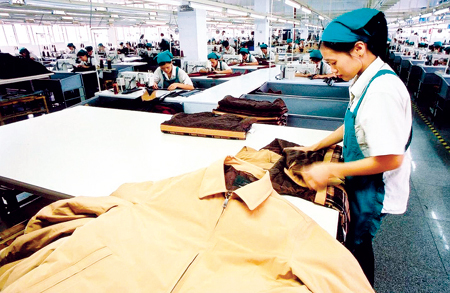He came back to their tiny apartment and laid the goods out on the dining room table.
回到他们的小公寓把这些东西放在起居室桌子上。
Regina began to cut the gingham, small sizes for toddlers,
瑞吉娜开始裁剪棉布,小的给初学走路的孩子,
larger for small children, until she had forty aprons. She began to sew.
大的给小孩子。知道她做了40个围裙。她开始缝纫。
At midnight, she went to bed and Louis took up where she had left off.
午夜十分,她才睡觉。然后路易斯接着干她没干完的活。
At dawn, she rose and began cutting buttonholes and adding buttons.
拂晓时,她起来开始挖纽扣眼,加纽扣。
By ten in the morning, the aprons were finished.
早上10点,围裙做完了。
Louis gathered them up over his arm and ventured out onto Hester Street.
路易斯拿着这些围裙冒险到郝思特街上卖卖看。

"Children's aprons! Little girls' aprons! Colored ones, ten cents.
“儿童围嘴!小女孩的!花的10分钱,
White ones, fifteen cents! Little girls' aprons!" By one o'clock, all forty were gone.
白色的15分钱!小女孩的围嘴!”到1点钟的时候,40个全卖光了。
"Ma, we've got our business," she shouted out to Regina, after running all the way home from Hester Street.
“孩子他妈,我们找到好生意了,”他从这街上一路飞奔回家后对老婆高喊着,
"We made two dollars and sixty cents in three hours of selling."
“三小时里咱们卖了两美元六十美分。”
He grabbed her by ther waist and began swinging her around and around.
他抓着她的腰开始转圈。
"You've got to help me," he cried out. "We'll work together! Ma, this is our business."
“你一定要帮助我”,他喊着。“我们一起努力工作,孩子妈,这是我们的事业。”
Jewish immigrants like the Floms and the Borgenichts
弗洛姆和鲍各尼特家这样的有犹太移民
and the Janklows were not like the other immigrants who came to America in the nineteenth and early twentieth centuries.
还有詹克洛家都不像那些在19世纪和20世纪早期来到美国的移民。
The Irish and the Italians were peasants, tenants farmers from the impoverished countryside of Europe.
爱尔兰和意大利的移民主要是来自欧洲贫穷乡下的农民和佃户。
Not so the Jews. For centuries in Europe, they had been forbidden from owning land,
但犹太人不是,几个实际以来在欧洲,他们被迫离开自己的土地,
and so they had clustered in cities and towns, taking up urban trades and professions.
拥挤在城市和城镇里,从事乡村贸易和职业。
Seventy percent of the Eastern European Jews who came through Ellis Island in the thirty years
东欧的70%的犹太人30年中主要来自艾丽斯岛,
or so before the first World War had some kind of occupational skill.
或在一战前有着某种职业技能。
They had owned small groceries or jewelry stores.
他们有小杂货店或珠宝店。
They had been bookbinders or watch makers.
他们一直是书籍装订商或钟表匠。
Overwhelmingly, though, their experience lay in the clothing trade.
但总体来说,他们的经验在服装贸易方面。
They were tailors and dress makers, hat and cap makers, and furriers and tanners.
他们是裁缝和服装制造者,帽子制造者,皮革制造商。
Louis Borgenicht, for example, left the impoverished home of his parents at age twelve
举例来说,路易斯·鲍各尼特在12岁的时候就离开了父母贫穷的家
to work as a salesclerk in a general store in the Polish town of Brzesko.
开始在布热斯科的波兰镇的杂货店做店员。
When the opportunity came to work in Schnittwaren Handlung
当他有机会在SchnittwarenHandlung店
(literally, the handling of cloth and fabrics or "piece goods," as they were known), he jumped at it.
(字面意思就是,如大家知道的处理布料和纺织品或“布匹”)里工作时,他加入了这个行业。
"In those days, the piece-goods man was clothier to the world," he writes,
“布匹行业的人对世界来说就是衣商”,他写道,
"and of the three fundamentals required for life in that simple society, food and shelter were humble.
“在那个简单社会里必须的三个基本要素,食物和简陋的庇护所。
Clothing was the aristocrat.
服饰是贵族的东西。












